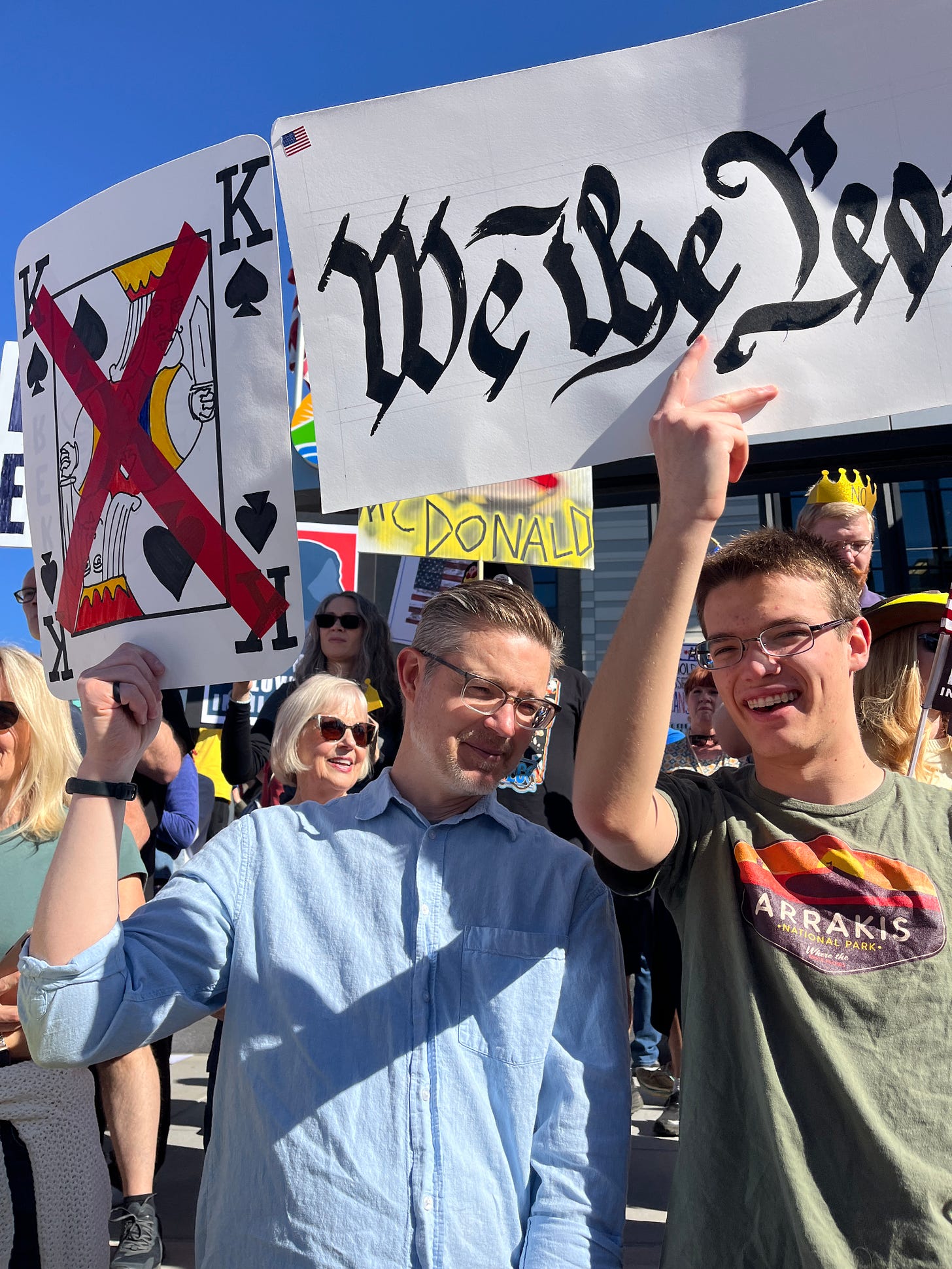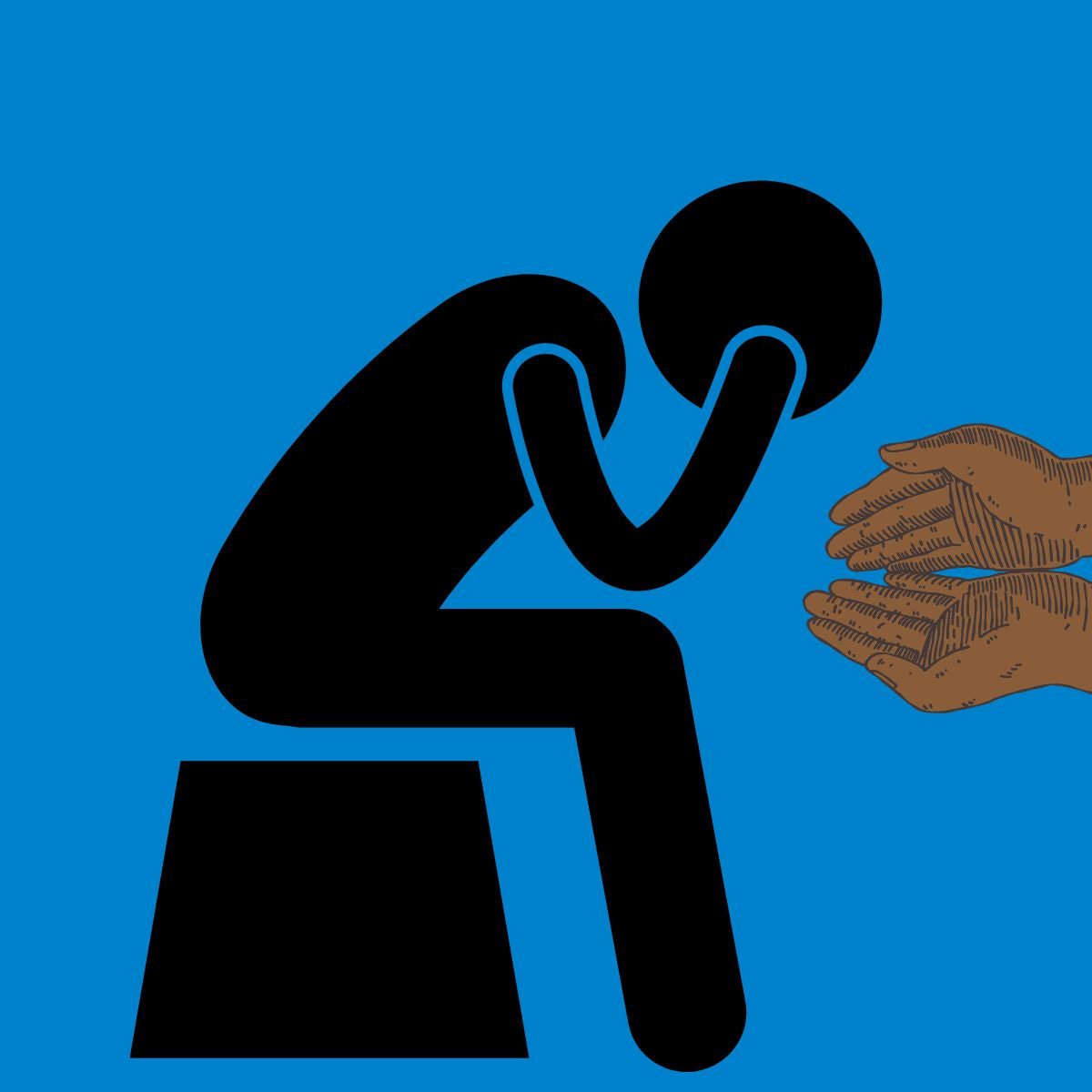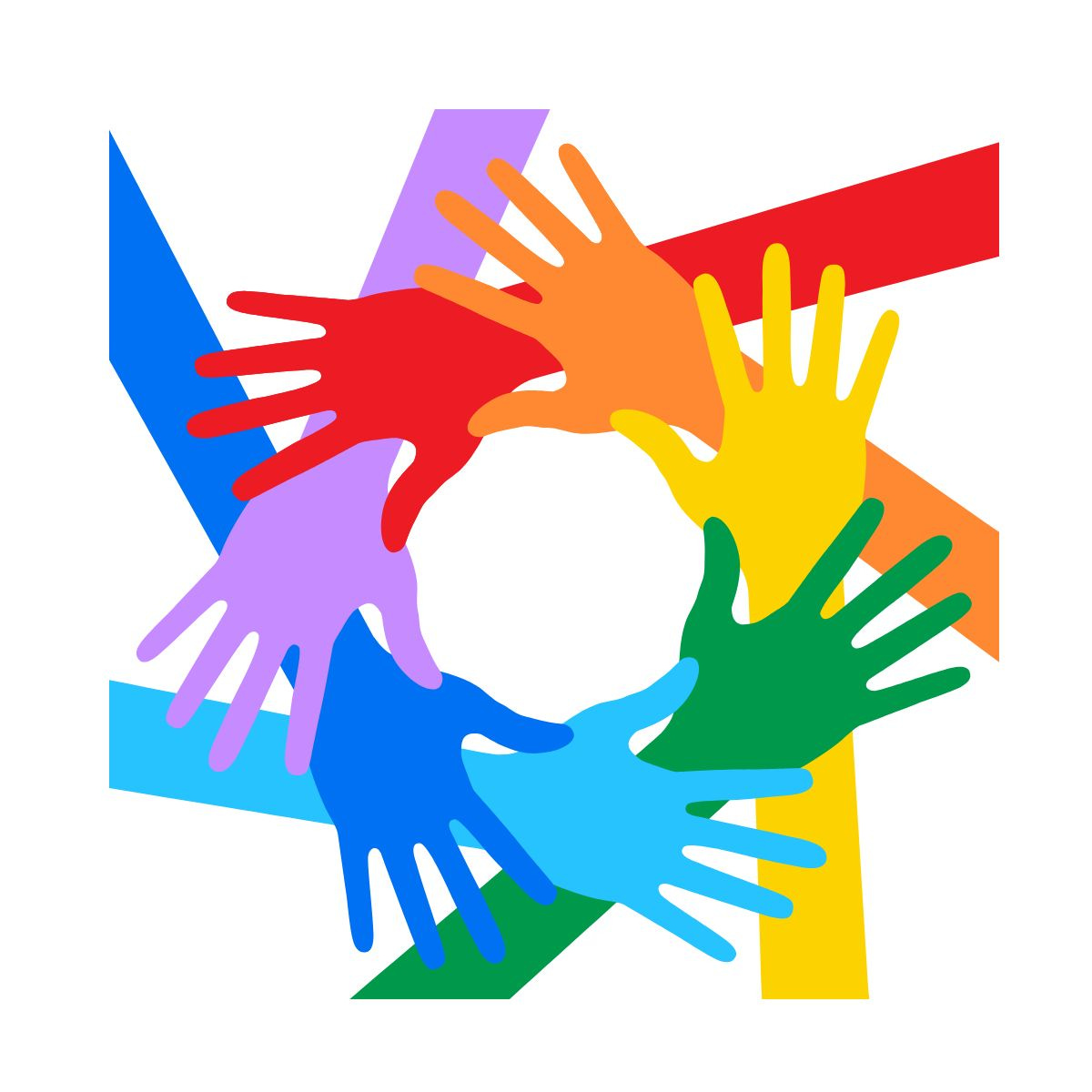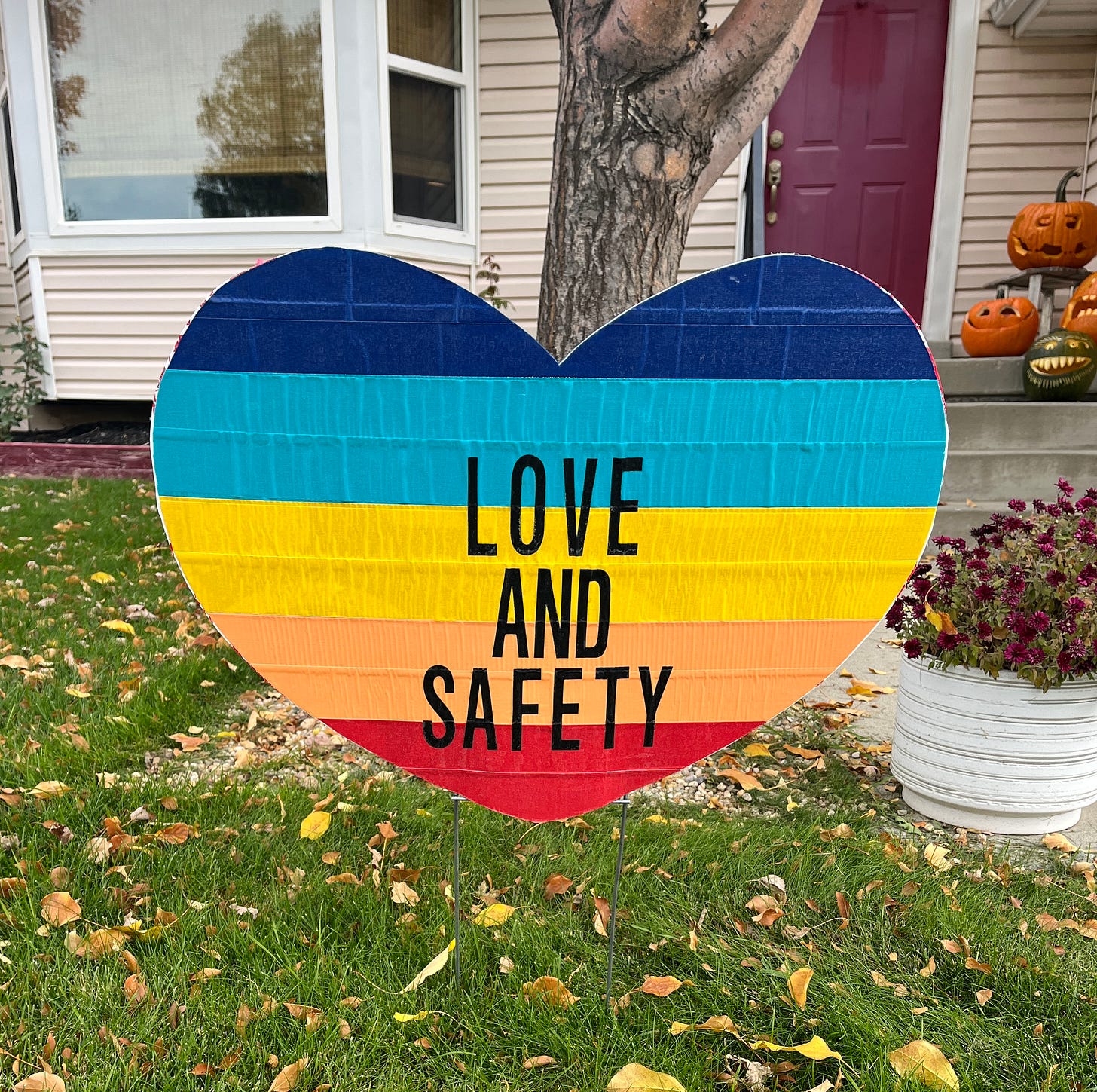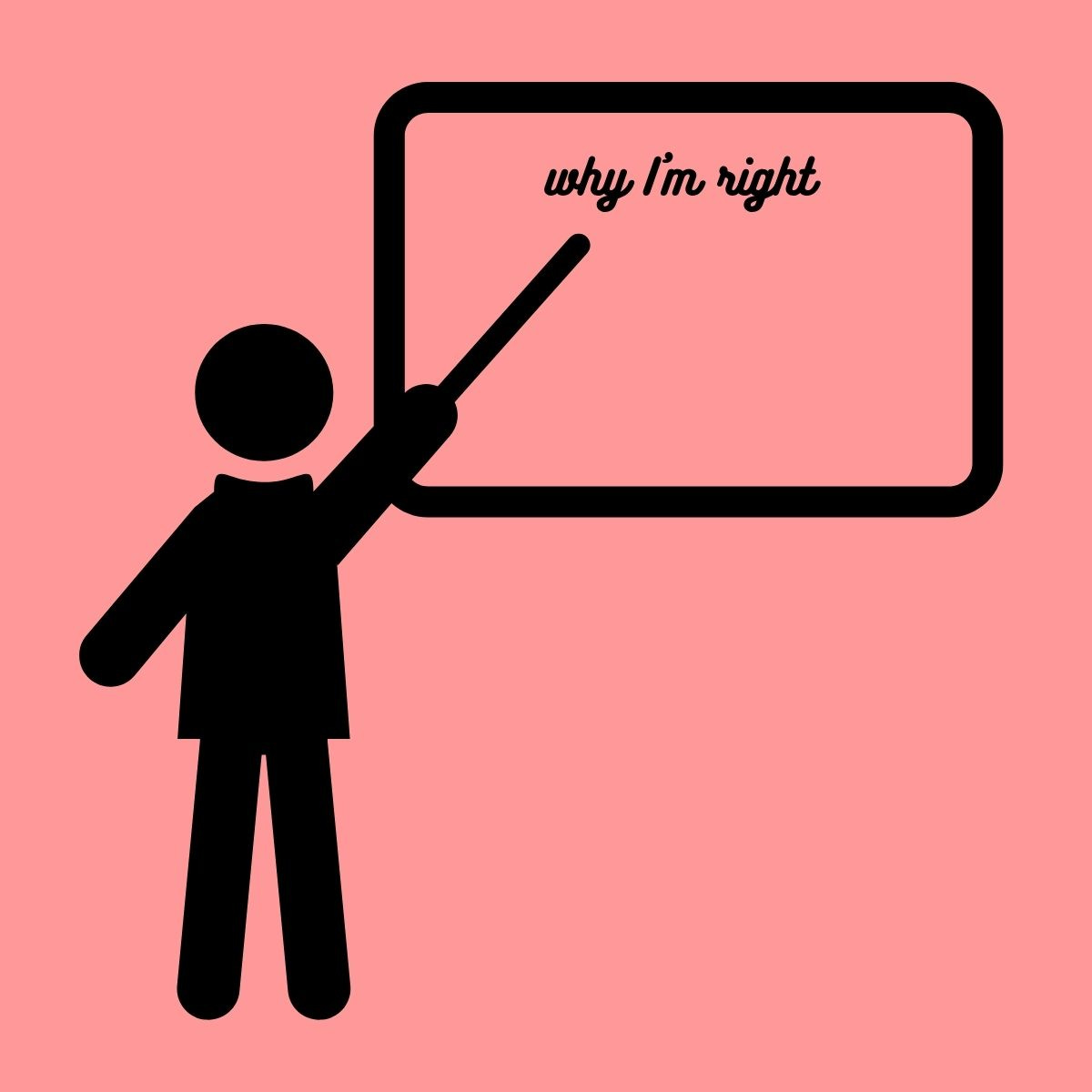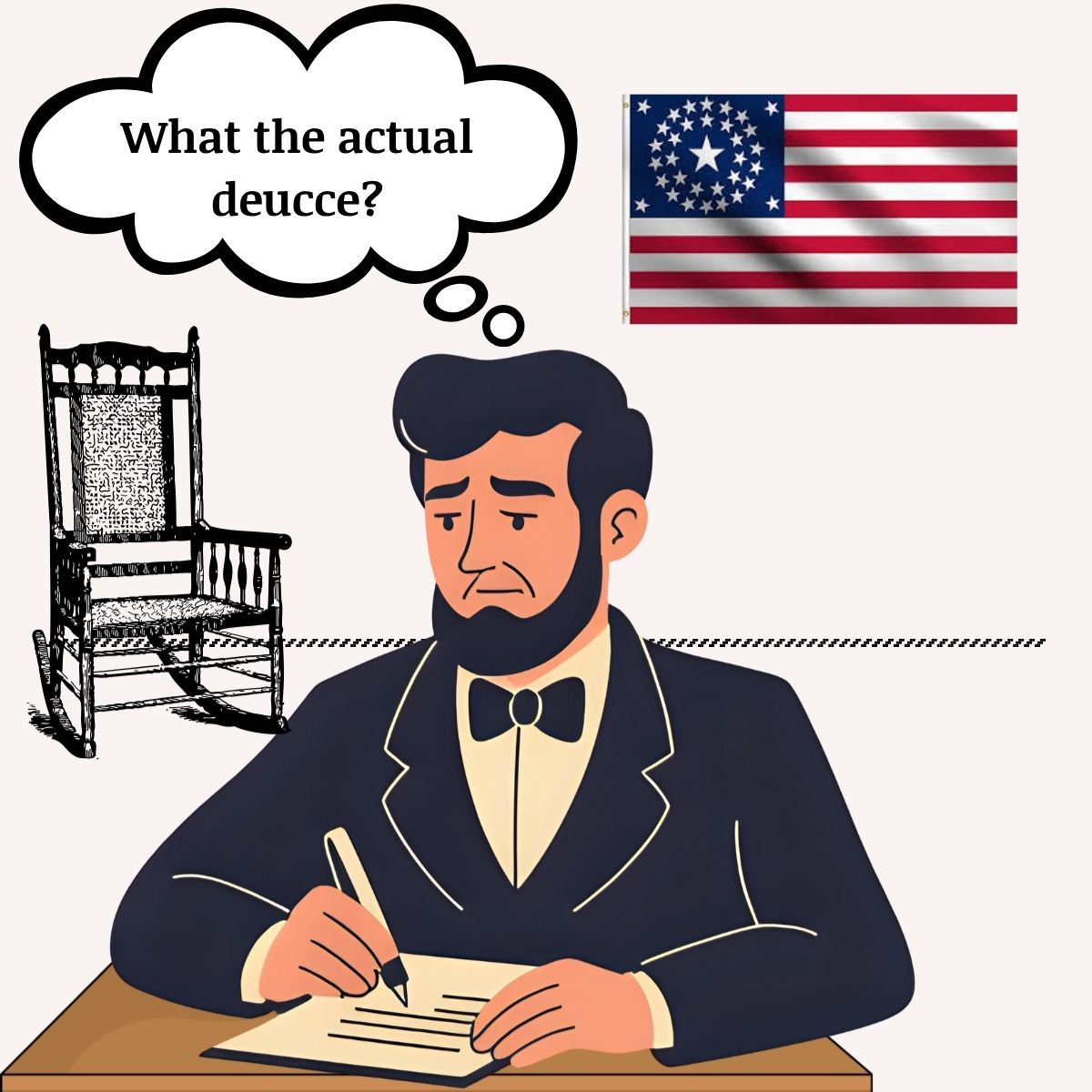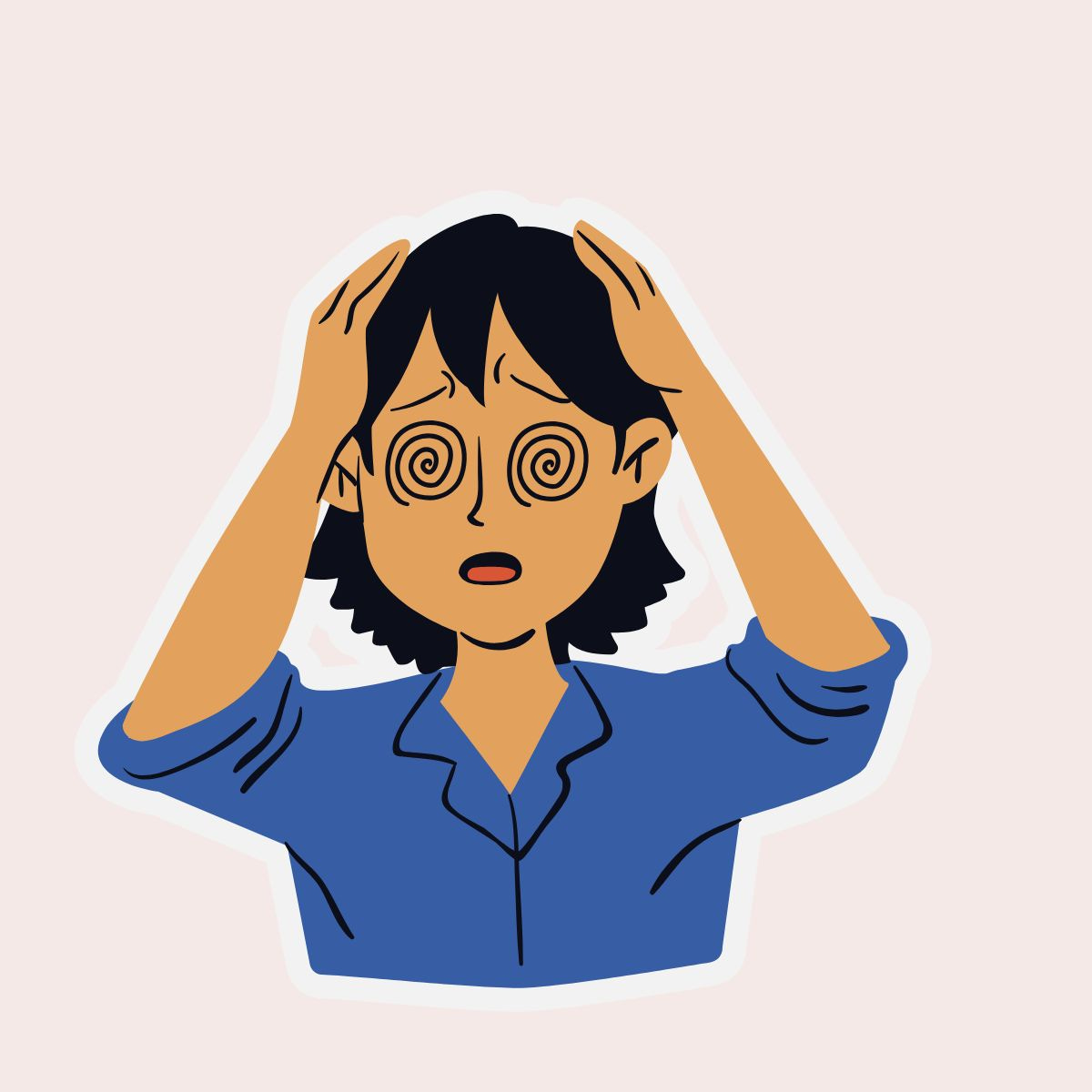Community in Differences
Protest Part II
This past weekend I attended another protest, this time with a teen in tow. This was the second No Kings protest. We went to Provo and brought our same signs.
We stood amongst the crowd. It was loud and it was peaceful. I saw people of all ages including veterans and two old lady friends who stood next to me waving American flags which warmed my heart. I saw many people holding signs ranging from clever and well-crafted signs to simple, scrawled out feelings on cardboard being held up by brooms. I felt a welling up of emotion for people who care so deeply about issues affecting us all right now. It all felt so sincere and fueled by hope and plea for change. Examples of signs:
Love, Not Hate Makes America Great
The Power of the People is Stronger Than the People in Power
History Has its Eyes On Us
This is What Democracy Looks Like
Make Atwood Fiction Again
People Matter, Laws Matter, Truth Matters
In America the Law is King
Oh Heck, Even the Mormons Are Here
A lot were funny, some expressed biting disapproval, and the ones that affected me most were signs with text from documents that I really need to brush up on.
From the Declaration of Independence:
He Has Kept Among Us In Times of Peace Standing Armies Without Consent (a grievance aimed at King George III, accusing him of maintaining a standing army in colonies during peacetime without the approval of the colonial legislatures)
When In The Course of Human Events it Becomes Necessary
From the Constitution:
No Title of Nobility Shall Be Granted by the United States
From the Book of Mormon:
”I seek not for power, but to pull it down.”
As we headed back to where we parked, a man wearing clothes covered in images of the flag stopped us and calmly asked Julian why he thought Trump was a king. Julian said it was because that’s what he calls himself. This man rejected that and I joined in to say that it seemed to me this is what he wants. He wants glory and praise and attention and seems to make everything about himself. I said he admires dictators. The man rejected that as well and Julian started to get really bothered which is understandable as it is difficult to keep emotions in check in such instances and takes great skill, practice, and maturity that most adults have not developed. So I excused us from the conversation and we went on our way. But I noticed that the man was very calm and with the appearance of curiosity.
There’s more I wished I’d have said, perhaps about abuse of power, denying press access, bypassing constitutional checks and balances, wanting to do away with the two-term rule, vying for his face on Mount Rushmore etc, but for now I’ll just say this to those who may be interested: This protest was very peaceful and it felt very pro-American. Attended by people who deeply love their country and felt it was their patriotic duty to stand up and identify where it feels in jeopardy, just like our forebears. That’s how I felt being there.
It felt so nice to be with people who shared similar feelings, who seemed to view things the way I do and to feel a little less crazy knowing I was not alone.
But I appreciated having a chance to converse with someone who did not feel the same, even if he wasn’t very receptive to our answers to his questions. We had differences and in other circumstances I’d have liked to try to have a conversation with him. I thought it was brave of him to be out there as a minority in this moment.
What is Community?
So what is community? What does community even mean? Is it a place? Is it a people? Is it shared ideas? Attributes or beliefs in common?
At first thought I might think it’s being with people with whom I share things in common. Religious or political beliefs, upbringing, interests.
But I think community is more than that, goes more deeply. It doesn’t make sense to me that community is something that happens automatically or as a mechanism by which to sort ourselves. True community must be something sought after, something felt, something built and chosen.
And it can’t be chosen if we don’t have all the information. If we’re not pushed outside ourselves. This is what I think.
I live in a very homogenous space. Racially, religiously, regionally and culturally. This creates a perception of sameness. When we first moved here this sameness was jarring. Before I left Utah i heard people talk about the lack of diversity. Being naive, I was confused thinking, but people are so different? I didn’t understand what I was missing out on.
In that space where there’s a lot of perceived sameness, there’s a lot of assumption, because there’s a perceived lower chance of being wrong. Assuming can feel nice because who wants to do the work of finding out who people actually are? Like individual people? Ugh, who has time for that? #lazy.
On the other hand, when you’re likely to be wrong, you get tired of it, so instead of making assumptions you wait to be informed. This is just one of the gifts of diversity.
When we were new here, I tried to resist making assumptions even though it was pretty likely.
We’d see a person and I’d say to a five-year-old Julian, “Yeah, that person goes to the same church as us!” as if it was a huge coincidence. I wanted to keep an outlook of diversity even when it was hard to find in the space around me. I found myself fighting against the pull to make assumptions even if that felt kind of dumb sometimes.
Because for me, a natural pull or human propensity also comes with threat. The threat of something. Of what? Becoming even lazier? Getting dumber? More boring? Losing my ability to be a free-thinking human? Making an ass out of you and me? These are very scary threats for me. As a nonconformist, I already carry flags and wear a whistle around my neck at all times, ever watchful and ready to ring some alarm. Mostly for myself, sometimes for others if they’re interested.
But here, the pressure increased and I had to level up my vigilance. Because when you have a group that looks like a set you get lazy in examining for differences. You say, “All good here. This is a pretty good sampling of the world. I feel I already know some things.”
Even if there’s not as much sameness as it appears, the perception and culture of sameness are still very strong. And we humans like to group ourselves together. We might make generalizations about our groups and other, outside groups. We might hear stories or make them up all on our own. With no one or no reason to challenge them, we believe them and perpetuate them.
The way we think, what we experience, and how society or our communities affect us is how biases are born. Left unchecked, the biases become stronger. The cultures divide and in order to survive and feel belonging, our biases dictate the rules, tell us who or what to fear. Things that are different, unfamiliar, alien become things that are scary.
We may reduce ourselves to our primitive lizard brains because of how scared we are. We size each other up, wondering where to put them so we know how to feel about them.
The less we examine our biases or look for opportunities to be wrong, we more we start making wider, sweeping generalizations and dangerous deductions about others who seem different.
Or even the same. We might think, You support this person? That must mean you _____. You attend this establishment? That must mean you’re this kind of person.
When we’re suspicious of others, that means we’re at odds. And if there’s suspicion, there must be fear. Fear of others. Fear of associating with them. Fear to show true selves, fear of sharing an opinion or viewpoint that might be attacked. Worst of all, fear of sharing things about ourselves that others condemn.
And when a person sees these groups and feels in their heart they themselves don’t seem to match that, they don’t fit into it, they feel unsafe. So they hide. How can we be in community when there’s so much suspicion and a lack of safety?
”Safety is not the absence of threat. It is the presence of connection.”
-Gabor Maté, physician and writer, who I seem to be seeing more and more these days.
It seems to me, that community ought to mean a place where one feels safe and free to be. A place of actual belonging. And the absence of danger is not enough. We have to actually connect—see and be seen. Prove that we are an emotionally safe space for others.
Putting the Unity in Community
Community. Co-MUNE-ih-TEE. Being the word nerd that I am, I thought hard about what the word means. I noticed another word inside: unity. Hmm. Is this relevant? What is unity? So much to define.
I looked up the etymology of “community” and as usual it doesn’t quite give me what I want. But it does give me some good stuff.
Here’s the breakdown:
Co or com = “together” or “fellowship.” Shared.
Munis = A Latin root related to providing services, public duties, or functions.
Jen’s made up etymological (Jenymological) breakdown:
Co or com = together, shared
Unity = No but REALLY, together. Chosen togetherness. With all our differences. T’is our public duty.
One definition of unity I found and liked was “a thing forming a complex whole.”
Complex.
I think I’ve come to the conclusion that you can’t really have true unity without differences. You can’t have unity if you don’t choose it. Therefore, the differences must be known in order for the unity to really be deliberate, chosen. There must be truth and authenticity. If those two things are allowed, differences will naturally, beautifully be exposed.
And there presents the moment to make your wise choice. Embrace or reject the differences? Because think of the alternative. If we reject differences, we cast a boring spell on ourselves. All good here. I already know some things.
If we quiet or hide the truth of ourselves, we are unknown. If our differences are unknown, this is not community. This is just sameness. Conformity. Assimilation. Then we disappear. Feel it now? Feel the threat?
What would you say is the opposite of belonging?
Being an outcast? Ostracization?
Brenée Brown says the opposite of belonging is actually fitting in.
Because what fitting often entails is hiding the authentic self, shushing our differences so we don’t cause a disturbance. We create a false or incomplete version of ourselves in order to exist safely.
Actual unity means differences in harmony. Or the other way around, you choose. And it’s not being in unity in spite of our differences, either. It’s openly welcoming them and acknowledging how important they are in making a better community.
Seeing differences as strengths, weaving them into the complexity of our communal fabric, fortified and bonded by a common goal, one that goes beyond how you look, dress, how or who you worship, who you are sexually oriented to, or however else you self-identify. Maybe there’s something bigger than all of those things. Something more important.
You think it’s nice to live amongst like-minded people who share the same beliefs and views. Ahh I like it too. It’s so nice. Sometimes I spend time with certain people just so I can get a hit of it. People who will repeat back to me things I like to hear is so cozy and comforting. I like having my views reinforced! I like having myself reflected back to me. So validating.
And maybe this isn’t necessarily a bad thing. But it’s incomplete and it can be atrophying. It limits the growth that’s possible. I propose embracing that discomfort, even seeking it out, because diversity is always, always better and makes for a much prettier picture.
Love & Safety
In my ongoing goal to show up more honestly in my life I am progressively deciding that I don’t really care about the judgment or withdrawn relationship that may or may not result from revealing things. Or rather, I should say, I do care. It can hurt. A lot. But it hurts my integrity more to withhold those things.
There are more important things, like being more explicit in my love for the things that matter to me and the people I care about and want to advocate for. Because it’s getting harder to delude myself into thinking there are more important things to worry about.
So early this summer, I asked Sean to make me a poster to put in the yard. It was to be a rainbow-striped heart. It was to have the words “love and safety.” It was carefully planned. Where I live there are many loving people. But I fear there are people who also have views that hurt others, as is true everywhere. But it could even be the majority here. It’s time to differentiate myself.
The challenge is figuring out how to stay in community among people who may hold these views. People with whom I’d still like to be in relationship with because we need to work together if change is going to happen.
The threat of division is omnipresent. We seem to be conditioning ourselves to scan for indicators of certain labels or views so that we can know how to categorically feel about a person, so we can know where to assign them or to write them off altogether.
But have you ever held a view of someone only to have it disproven? This is an example of the good tension. This happens to me a lot. I hear someone share an idea and think, oh wow, ok. And I make all sorts of assumptions about them and emotionally excuse them from the running for potential friendship.
And then I have a conversation with them later where they say something that completely counters what I thought. They said what I thought was a pretty unattractive thing, and they showed some true warmth and humanity because oh yeah, they’re a complex human. Both/and.
It’s really tiring to have this kind of vigilance. Sometimes I wonder if I’m going about it the right way. What if it wasn’t my job to sort people? What if I excused myself from this task? What if I let go of this grave importance of organizing everybody into camps or the idea that we need the camps at all?
A friend of mine recently told me about her experience being in a special recovery hospital for her daughter who’d suffered a traumatic injury. She described how unusual it was that things that usually matter to us, big classifications that feel of the utmost importance did not matter there. Religion, politics, and other big identifiers. They were there, they saw them.
But, she said,
“It wasn’t a thing that stopped people from loving each other. There really were no classifications other than your injury level.”
What if we regular civilians made this the priority? What if this was how we viewed each other and made our primary concern?
Then the other day I was flipping through pages of my church journal and found a bible scripture I’d copied down:
1 Corinthians 25-26:
That there should be no schism in the body;
but that the members should have the same care one for another.
And when one member suffer, all the members suffer with it;
or one member be honoured, all the members rejoice with it.
When one member suffer, all the members suffer with it. Whether there is injury here should be the only classification.
In case you, like me, want to use this cool word more, here’s the definition of schism:
”a split or division between strongly opposed sections or parties, caused by differences in opinion or belief.”
Note that it does not say “necessary, unavoidable split or division.” Just a split that can happen. Maybe often happens. But doesn’t have to. It’s treatable.
My latest goal is to reprioritize how I view myself and others. Am I ___<identity marker>____ first? Or am I a human first? What if I saw others as humans first? My goal is to not forget my humanity.
If someone feels scared to live in a place, this seems important. It’s up to us who already enjoy safety to make the place safer. To create more belonging. To create a stronger body.
Sean made my signs and then bought himself a rainbow-striped tie to wear to church. I wish the congregation where I live was a place where people felt safe to be who they are out in the open. I don’t think it is. Yet. I’m working on it. We’re working on it. It’s a process.
This was our first time really publicly “coming out” in support of a group of people who have even more reason not to make themselves known. See the layers? I hide my support of others who have a worse time of it, who have an even greater risk to their safety. This breaks my heart.
To you: I am ashamed and I am sorry I’ve been quiet for so long. For I know what it feels like to have to hide myself around others. I know what it’s like to feel alone amongst people. To share the same space, to share the same blood even, but not feel part of the same body. To attend the same gatherings, to breathe the same air, but not feel community.
One Sunday a young quiet person told Sean they liked his tie.
Another Sunday someone remarked that his tie sure was colorful.
Another Sunday, a woman visiting our ward for a missionary farewell approached Sean and said,
”I just wanted to thank you for your tie. I came here with three women who are all gay. They noticed your tie and it means a lot to them. Thank you.”
I am learning that to be in community with others, you might need to declare it or wear it. To verbally, visually offer it. To make it known. To be explicit with who you are, what you’re about, and who you’re trying to reach out to. To be explicit with your love.
And if it’s not the kind of loving you’re used to, that’s ok. It might take practice.
If you’re looking for examples on what this kind of love can look like, I highly recommend the instagram account liftandloveorg or here’s the website: www.liftandlove.org
Moral Courage
There is a podcast I discovered several years ago that gave me a community within my church. It’s called Faith Matters and when I found it I felt like I’d found a home. A place to explore and ponder, openly question without fear and to expand and develop my own spirituality. Each year they hold a 3-day conference called Restore, whose aim is to restore faith, belonging, wholeness, and community building.
Arthur Brooks, Catholic speaker and author who wrote the very important book, Love Your Enemies said in a talk of the same name,
“True moral courage is standing up to those with whom you agree on behalf of those with whom you disagree.”
We think it’s standing up to those with whom you disagree. It’s not. That might be scary and confronting but consider the position of the person in both scenarios. In one, two are at odds. In another, two are together, with one trying to bring in a third. I have been thinking about this statement a lot. I’m pretty sure there’s a Dumbledore quote here…. yes, here it is:
“It takes a great deal of bravery to stand up to our enemies, but even more to stand up to our friends.”
I saw a video recently of Senator and presidential candidate John McCain who was meeting with supporters who had a lot of prejudice, fear and anger toward Barack Obama, his opponent.
McCain said, ”I have to tell you, he is a decent person and a person that you do not have to be scared of as president of the United States.”
To a woman who expressed fear, calling Obama an Arab and therefore could not feel ok about him, McCain responded by saying,
“No, m’am. He’s a decent family man and citizen that I just happen to have disagreements with on fundamental issues.”
At Restore, Brooks described our country being like an enormous couple on the verge of divorce and we have serious habits that we need to break. I’ll talk more on relationships later, but if your goal is to simply hate others, then that’s easily done on a road that leads nowhere.
Brooks cautions though that “Nobody has ever been hated into agreement.”
If you feel yourself angry at entire groups or maybe individuals, you may want to pause to reflect on it, break it down, get curious about how you got there and then re-evaluate and see where you lie. Maybe there’s some faulty foundation there.
Here’s a breakdown Brooks gave that might be helpful:
Anger = “I care what you think and I want that to change.”
Disgust = “Someone or something is a pathogen.”
Disgust + anger = contempt. Which = “the conviction of the worthlessness of another person.”
It seems that anger, left unchecked, can evolve into contempt, a known relationship killer. Think how quickly it can happen.
So-Called Enemies
Many years ago I had a friend who expressed disdain for their many enemies. I remember being amused at the time because I was like, who has enemies?? It felt comical to me, exaggerated, like from a storybook or superhero movie.
Like the Count of Monte Cristo who has obvious enemies. Julian recently had us watch the new French version and it was fun to watch the Count be so conniving seeking revenge against his enemies (until, you know, it almost destroyed him. Boring).
I have come in contact with many people who I might not describe as “enemies” but maybe… “antitheses to my being”? When I’m with these people, it’s amazing and also comical how it almost feels like some magnetic force that comes from within that repels me away from them. We are at total odds and it would seem there exists no easy space where both of us can remain.
But if I look closer, I might consider my “enemy” to mean “people it’s hard to love or want to be in close proximity to.”
Who would be on that list? Perhaps…
People who think very differently from me. Maybe have different beliefs and views from me. Views that perhaps disgust me or make it difficult to remain in relationship.
People I have trouble respecting.
People who mistreat others.
People who have hurt me.
People who seem really rigid and narrow in their views, who seem incurious.
People-pleasers who seem to lack a solid self that I can lock onto.
People who I’d call ignorant. People who don’t vaccinate their babies and then fear measles outbreaks.
People I struggle to understand, who seems to exist on an entirely different plane. When I feel there are too many obstacles.
People who are difficult to talk to. This might include emotionally immature, unavailable people, people who I describe as “inaccessible,” or people so anxious, it feels we are miles apart with no clear way to meeting up in the center.
It’s easy to bail on certain types of people. I really need to work on having a more giving heart and to practice some radical patience and humility.
When I get curious about what compels this feeling, what lies at the core of this reflex, I am not at all sure. My guesses:
I fear the disrespect I may feel toward them.
I fear the loneliness that can result in failed connection.
I fear the unpleasantness that comes with having to interact with someone I don’t like.
I fear what I deem impediments to being able to connect with someone. The obstacles seem too great, too exhausting.
I think I might fear the threat of my own inhumanity. Like maybe I don’t trust myself? I don’t want to other-ize. But I might. I do.
There’s a lot I don’t want to know about people. A lot of “don’t ask, don’t tell” in my community. Because of unspoken rules we’ve made for ourselves in terms of being in relationship. Well I can’t be in relationship with someone who ______ so I’d just rather not know. We create rules for ourselves, draw hard, dividing lines. I recently heard of a person who couldn’t minister to someone because their political views don’t align. They just couldn’t.
So our topics of conversation are restricted to a select few. And this is a relationship-compressor, not expander. If you feel safe only talking about or sharing about yourself a select few things, what kind of relationship is this? Where is the safety? The unity? This is a fragmented, fragile relationship on feathery foundation. It won’t build. It won’t grow.
Doing things this way will not allow me the open heart required to be in community with others. These habits I have of writing people off because of all those reasons are habits I’d like to challenge.
I once spoke with a woman who had a sister who lived in or near San Francisco, one of my favorite places, and how fearful she was. She was afraid of the effects of those “outside influences” on her kids. How Utah seemed to be a safer place. I expressed to her I felt a similar thing living in Utah, except the other way around. I was worried about the “effects of Utah” on my child.
She just stared at me. It was one of those classic examples of being with someone who assumes you share a similar view on something and speaks accordingly. Maybe she saw I live in Utah and drew up some conclusions. This person was interesting because she was someone around whom I had to sort of grit my teeth in order to establish some kind of connection, piddly as it might be. I would guess we disagree on most things. I work hard every time we meet to find something—an-y-thing. And I do. It’s not always easy but it’s there. And I’d still consider us friends. Because why make her an enemy? What’s the point? She’s a person just like me.
Brooks says, “Civility and tolerance are a low standard. Only by loving our enemies can we redeem them.”
I can tolerate my neighbors and enemies but this does little to create community. It seems I need to break my own rules and somehow get good at having dialogue with people who see things differently. I have had many struggling conversations with people—attempts to engage in a dialogue to see if there is connection.
We see things through our own lens of meaning, through our own perspective and assume others see it that way too. We’re smart, we’re reasonable. Surely they’ll see it the same way. And if they don’t, they’re wrong and probably sadly ignorant. We feel like our way is obvious, clear, and right, so they should get that. Instead of trying to understand them, we assign ourselves the job to point out their ignorance and educate them.
Or, we assign false motives to their way of thinking, an extra dangerous step to take.
Brooks calls this:
Motive Attribution Asymmetry: a cognitive bias where conflicting groups attribute their own actions to ingroup love (positive self-interest) while perceiving their opponents’ similar actions as driven by outgroup hate (negative animosity).
This helps justify our stance and it is an error on both sides. I love, but the other side hates.
To stop the error, it seems we should:
a) STOP assuming.
b) develop a new muscle of challenging our own thoughts and beliefs, not seeing that as scary but essential, and allowing others to help us on our quest by inviting them to share their own. Recognize we might still have things to learn from others, especially those who see things differently.
c) be curious in our differences and be patient with others’ misunderstanding. Be curious about our own. Try again when we fail. Make amends. Reach out in good will.
Here’s an example.
I have a brother-in-law who shared a detail about his father’s work, something I had no clue about and made an assumption and comment of something like, “yikes.”
Instead of taking offense, he very patiently saw my ignorance and saw it as an opportunity to explain to me more about what it was. As he explained I was humbled. I saw my error and felt love from someone who leaned in in that moment to my mistake, and invited me to understand better. Radical patience.
Diversify and Listen
In an interview on Women and Leadership, Sheri Dew, who worked for decades in the publishing industry and held various leadership positions within the LDS church, said this about her experience:
”We always got better answers when there were both men and women in the room.”
When asked for tips on better leadership, she said this:
”Listen to everyone around the room. Don’t parrot. Listen especially to those who disagree. Be the kind of leader to inspire and encourage feedback, and be able to recognize it.”
Remember how Abraham Lincoln had his “Team of Rivals?” He deliberately selected people with opposing views from differing affiliations to be part of his cabinet because he wanted the best possible outcome. Be wary of leaders or speech that shuts out entire groups or categorizations of groups, or even vilifies them. Be wary of leaders who can’t tolerate different points of view or even punish those who do, using their position of power. This is not progress. It is not the answer. It is not good leadership. We know this. But maybe we forget. Because we are lizards.
Here’s a snippet from a letter Abraham Lincoln wrote to his friend Joshua Speed in 2025—oops, I mean 1855:
”Our progress in degeneracy appears to me to be pretty rapid. As a nation, we began by declaring that “all men are created equal.” We now practically read it “all men are created equal, except negroes.” When the Know-Nothings get control, it will read “all men are created equal, except negroes, and foreigners, and Catholics.” When it comes to this I should prefer emigrating to some country where they make no pretense of loving liberty -- to Russia, for instance, where despotism can be taken pure, and without the base alloy of hypocrisy.”
(By the way, the “Know-Nothings” were a political party who swore oaths of secrecy so that when people would ask about them, they replied, “I know nothing.” They were pro-nativism, anti-Catholic and immigrant, were associated with acts of violence toward immigrants and and “anti-know-nothings,” a term that makes me laugh and one I’d like to adopt for myself, and eventually split and dissolved over the issue of slavery.)
Quentin Cook, a leader and apostle in the LDS church said this:
“Unity does not require sameness, but it does require harmony. We can have our hearts knit together in love, be one in faith and doctrine, and still cheer for different teams, disagree on various political issues, debate about goals and the right way to achieve them, and many other such things. But we can never disagree or contend with anger or contempt for one another.”
If we are really in community with one another, why are we so scared of our differences?
I try to be my whole self no matter my surroundings but I find myself slipping into stealth mode about what I truly think about things because I do not see myself reflected very often in my environment. I assess the situation and if there’s not a strong enough feeling (or proven record) of safety, I withhold to prevent doing something that threatens that safety or belonging.
Often there’s a response that feels a lot like, “What you are saying is confusing to me and it scares me and I’d like you to shut up now.” So I withhold. And then I start to disappear. I could be wrong. This could be a misperception on my part. Buuut it happens a lot and I’ve gotten pretty good and noticing the signs.
Often what happens is someone says something to me that feels based on an assumption that I think the same way and, not wanting to mislead, I make it known that I don’t, and then it gets uncomfortable. One can get flustered because this is requires an enormous unanticipated pivot and they/we don’t know how to talk about the thing and we forget we don’t actually have to agree.
To close, at long last, safety and space for differences must be made clear. We must act. It must be made explicit. We must go out of our way to say to people, “I see you and your differences and love you and invite you in because I want you to be here. Your uniqueness doesn’t scare me. You’re not too much. I’d like to learn more about you. What’s it like to be you? I don’t think that way but how did you come by this thinking?”
This is something I really need to work on.
It seems to me a good place to start is to see people as complex humans first, let them know we see them, and then prioritize safety.
And get really good at recognizing injury. If there’s been a history or an episode of harm for a person, we must make ourselves stand out and say, “not me though.” And then stand beside them.
Our differences are a huge gift. They make a community better. When we open ourselves up to the possibility of another way and choose to push through the barriers differences seem to present, we are utterly free to love in a new way, without rules and constraints. And then we can begin to build. ◼️

